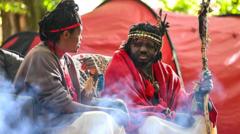Why Is This African Tribe Facing a Second Eviction Notice?

Published: 2025-09-19 16:05:19 | Category: technology
A self-styled "African tribe" known as the Kingdom of Kubala is facing a second eviction notice in the Scottish Borders after relocating their camp. Initially evicted from a privately-owned site near Jedburgh, the group moved a short distance to land owned by the local authority. Scottish Borders Council is now taking legal action to remove them, with a deadline set for their departure.
Last updated: 31 October 2023 (BST)
Understanding the Kingdom of Kubala
The Kingdom of Kubala emerged in the Scottish Borders, claiming to represent a new cultural identity and rights to land based on ancestral ties. The group's leaders, Kofi Offeh and Jean Gasho, present themselves as royal figures, King Atehehe and Queen Nandi, respectively. They assert that their existence as a community reflects a historical connection to the land.
Key Takeaways
- The Kingdom of Kubala was created by individuals who claim ancestral rights to the land in the Scottish Borders.
- Scottish Borders Council has initiated legal proceedings to evict the group from their newly established camp.
- Despite previous eviction notices, the group relocated nearby, demonstrating a determination to remain in the area.
- Local officials are considering further legal action if the group does not vacate the premises by the given deadline.
- The Kingdom of Kubala claims that they cannot be destroyed, reflecting their commitment to their cause.
The Background of the Kingdom of Kubala
The Kingdom of Kubala was founded earlier this year when Kofi Offeh and Jean Gasho established their initial camp in the Jedburgh area. This camp was set up with the intention of creating a community that embodies their vision of cultural heritage and identity. The group's philosophy revolves around self-determination and their perceived ancestral rights.
Origins and Beliefs
Offeh, originally from Ghana, and Gasho, who hails from Zimbabwe, have embraced the roles of King and Queen of this self-declared kingdom. Their titles and the accompanying ceremonial practices signify a cultural revival and a desire to reconnect with their roots. The presence of a "handmaiden," Kaura Taylor, from Texas, further showcases the diverse backgrounds that contribute to the Kingdom's identity.
The First Eviction Notice
In late October, the Kingdom of Kubala was served with an eviction notice from a privately-owned site near Jedburgh. Local authorities acted after receiving complaints regarding their presence on the land. The eviction was reportedly due to the land being owned by private entities, which had not granted permission for the group's occupation.
Reasons for Reoccupation
Despite being evicted, the group chose to relocate just over a small fence to a new site. This move highlights their determination to establish a permanent presence. However, their new location was soon discovered to be on land owned by Scottish Borders Council, prompting further legal challenges.
The Second Eviction Notice
Scottish Borders Council's decision to pursue legal action against the Kingdom of Kubala for their new camp indicates a firm stance on land ownership and usage. Local councillor Scott Hamilton has stated that the group must vacate the area by noon on Monday, or the council will explore additional legal avenues, such as seeking a sheriff's order.
Local Government's Response
The council's actions reflect broader concerns regarding unauthorised encampments in public spaces. Hamilton's comments suggest that local authorities are committed to maintaining control over land use and preventing what they perceive as unlawful occupation.
Community Reactions
The emergence of the Kingdom of Kubala has elicited mixed responses from the local community. Some residents express support for the group's cultural aspirations, while others worry about the implications of unauthorised settlements. The situation raises questions about land rights, cultural identity, and local governance.
Legal Implications
The ongoing legal battle illustrates the complexities surrounding land ownership and the rights of individuals to assert claims over property. The Kingdom of Kubala's assertion of ancestral rights challenges conventional notions of land tenure and highlights a growing conversation about cultural heritage and rights in the UK.
What Happens Next?
The Kingdom of Kubala faces a crucial deadline as they must vacate their current camp by noon on Monday. Failure to comply may result in enforcement actions by the Scottish Borders Council, and potentially the involvement of law enforcement. This situation raises uncertainties about the future of the group and their aspirations for establishing a permanent community.
Potential Outcomes
Several scenarios could unfold following the council's deadline:
- The group may choose to relocate again, possibly further challenging local authorities.
- They may engage in dialogue with officials to seek a resolution that allows them to remain.
- Legal battles could ensue, potentially setting precedents for similar groups in the future.
Implications for Cultural Identity and Land Rights
The situation surrounding the Kingdom of Kubala raises important questions about cultural identity and land rights in contemporary society. As more individuals assert claims based on ancestral connections, the discourse on land ownership and usage must evolve to accommodate these perspectives.
Broader Context
Across the UK, there are growing movements advocating for the recognition of indigenous rights and cultural heritage. The Kingdom of Kubala's claims may resonate with other communities attempting to assert their identity and connection to the land. This phenomenon could lead to increased scrutiny of land laws and their implications for cultural groups.
Conclusion
The Kingdom of Kubala's struggle in the Scottish Borders is emblematic of a broader conversation about land rights, cultural identity, and governance. As the group prepares to face eviction once more, their story raises critical questions about the future of community, heritage, and belonging in an increasingly complex legal landscape.
As we observe the developments surrounding the Kingdom of Kubala, it is essential to consider how cultural aspirations can coexist with legal frameworks and land ownership. The outcome of this situation may influence similar movements in the UK and beyond. #KingdomOfKubala #CulturalIdentity #LandRights
FAQs
What is the Kingdom of Kubala?
The Kingdom of Kubala is a self-declared community in the Scottish Borders, founded by Kofi Offeh and Jean Gasho, who assert ancestral rights to the land.
Why were they evicted initially?
The Kingdom of Kubala was evicted from privately-owned land near Jedburgh due to a lack of permission from the landowners for their encampment.
What actions are being taken by Scottish Borders Council?
Scottish Borders Council has initiated legal proceedings to remove the Kingdom of Kubala from their new site, which is on land owned by the council.
What will happen if they do not leave by the deadline?
If the Kingdom of Kubala does not vacate by the set deadline, Scottish Borders Council may seek a sheriff's order to enforce their eviction.
How does this situation relate to cultural identity?
The Kingdom of Kubala's claims highlight ongoing discussions around cultural identity, land rights, and the recognition of ancestral connections to the land.



